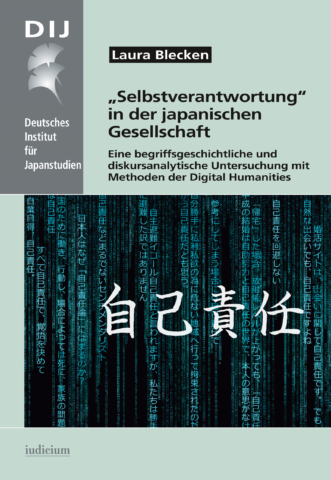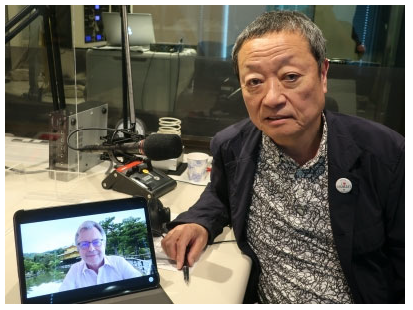Veranstaltungen und Aktivitäten
Keynote talk by Susanne Brucksch at Robotics Conference

DIJ Principal Researcher Susanne Brucksch will be one of four keynote speakers at the 17th IEEE International Conference on Advanced Robotics and its Social Impacts (ARSO 2021). In her keynote on Friday, July 9, Susanne will reflect on how the relationship between humans and devices in medical contexts can be specified when the sociocultural dimension of a particular locale is included. For instance, the study of the social context provides manifold insights on knowledge production, research and development processes, user contexts, and the institutional background of the making and application of medical devices. Examples from the research literature and case studies will illustrate these intersections. Her talk draws on her recently published co-edited volume Humans and Machines in Medical Contexts in Japan and her book chapter „Robotic Care Devices: Aktuelle Entwicklungen in der Pflegerobotik in Japan“ in Genese und Folgen der Pflegerobotik (in German).
Understanding ‚Self-responsibility‘ in Japan – New DIJ Monograph

Hostages in war zones, nuclear refugees from Fukushima, and workers in precarious conditions: all have been assigned personal responsibility for their situation by the Japanese word jikosekinin. The term – literally translated as “self-responsibility” – has become a keyword in contemporary Japanese society. But what does jikosekinin mean and how was the term established in the Japanese language? This study (in German) by Laura Blecken examines this multi-faceted concept by combining methods of conceptual history and discourse analysis with tools from the digital humanities. It traces the word back to its roots and creates a model for its different meanings through which various discourses converge. Finally, the study investigates how jikosekinin is used today by analyzing almost 40,000 blog posts. The latest volume in the DIJ Monographs Series examines the omnipresence of jikosekinin in everyday life and its role between traditional moral values and the impact of global neoliberalism. Details, including summaries of the book in English and Japanese, can be found here
Workshop ‚Technology & Society in Japan and Beyond‘

Technical artefacts, technologies, and infrastructures are shaping our everyday life in manifold ways. At the same time, their development, promotion and/or rejection is influenced by cultural patterns, ethical principles, social values as well as power relations. This one-day workshop of the Research Initiative ‘Technology & Society in Japan and Beyond’ brings together scholars who share an interest in the analysis of co-construction processes of technology and society in Japan and beyond. Twelve speakers will address the themes ‚User, Visions and Technology Development‘ and ‚Ethics, Health and Technology in Context‘. The workshop takes place online on June 25 and is organized by Susanne Brucksch and Cosima Wagner (FU Berlin). Details and registration here
Gender & Sexuality series lecture on women in Japanese videogames

This presentation examines the representation of women in Japanese videogames, situating the depiction of female bodies in terms of political discourse. Focusing on the online card-based wargame Kantai Collection, it analyzes how attributes of Japanese warships are reflected in the physical characteristics of women. At the same time, Kantai Collection is highly political in its theme, representation of women, and enactment of war memories. This presentation examines the game and related artefacts as part of a popular politicization of WWII by Japanese artists, also seen in the recent spate of blockbuster revisionist films, as well as Nazi imagery and narratives in anime and manga. It argues that the hyper-sexualization of women in Kantai Collection contributes to the exoticization of war as distant and unreal, in a continued context of controversial war memories in Japan. This event is part of the DIJ’s lecture series ‚Gender and Sexuality in East Asia‘. Details and registration here
Speaker:
Rachael Hutchinson, University of Delaware
Live-stream Tokyo Olympics book presentation

DIJ deputy director Barbara Holthus and our alumni Hanno Jentzsch and Florian Purkarthofer as well as Wolfram Manzenreiter (all Japanese Studies, University of Vienna) will present their chapters from Japan Through the Lens of the Tokyo Olympics at a panel discussion and book presentation on June 23. They will be joined by Georg Spitaler (Association for the History of the Workers‘ Movement, Vienna) and Corina Gallmetzer (University Library, University of Vienna). The book is an outcome of the DIJ’s special project on the Tokyo Olympics and is available for free download (open access) on the publisher’s website. The event will take place online and can be viewed via live-stream. Details and registration here
Recovery Games under the Mask – Joint JDZB & DIJ panel discussion

Olympic and Paralympic Games last on average 34 days – the preparations of the host city, however, take years. The Games have a significant impact on the cityscape, politics, society, economy, and public discourse of its host city and country. To discuss social, political, economic, and historical aspects of the Games, the Japanese-German Center Berlin (JDZB) in cooperation with the DIJ hosts a virtual book talk and panel discussion, preceded by short input statements by DIJ researchers Sonja Ganseforth, Barbara Holthus, and Torsten Weber, DIJ alumnus Axel Klein (Duisburg-Essen University), and Wolfram Manzenreiter (University of Vienna). They have all contributed to the DIJ special project on the Tokyo Olympics and are authors of the recent publication Japan Through the Lens of the Tokyo Olympics (Routledge 2020, open access). The event will be moderated by Alastair Gale, Japan Editor at The Wall Street Journal. Details and registration here
„Sophistication with understatement“ – Franz Waldenberger interviewed on Japanese radio

DIJ director Franz Waldenberger shared his views on Japanese and German society in an interview series with Oguro Kazumi, the host of Lohas Talk on J-Wave radio. Franz introduced the institute, its research, and his own interests in Japanese society and economy. He revealed that he had a „positive culture shock“ when he first came to Japan and that he was impressed with the unique „atmosphere“, importance of „human relations“, and „politeness“. The talk also touched upon women in politics, work-style, and work-life-balance. „In Germany, above all result matters but in Japan people are praised for their efforts“, he observed. On energy politics, Franz criticized that calculations of the costs of nuclear energy in Japan usually omit the costs for the disposal of nuclear waste. He praised the appeal of Japanese culture which, however, the Japanese themselves did not promote enough due to their attitude of „sophistication with understatement“. An audio file of the talk (in Japanese) is available here.
Next DIJ Method Talk: Kaitlyn Ugoretz on digital ethnography

While emic definitions of Shinto often describe the ritual tradition as the unique “indigenous faith of the Japanese people”, such claims are troubled by the growth of a “global Shinto.” The confluence of Japanese strategies for repositioning the nation as being of global import over the last few decades have rendered Shinto attractive and available to non-Japanese people around the world. Based on several years of multi-sited digital ethnographic research, in this presentation Kaitlyn Ugoretz will examine the development of transnational, digital Shinto communities on social media over the last twenty years. She will conclude with a reflection on the importance of digital ethnography as method in response to obstacles to traditional research during a global pandemic. Details and registration here
Speaker:
Kaitlyn Ugoretz, University of California, Santa Barbara








 Open Access
Open Access 
